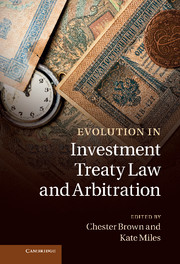Book contents
- Frontmatter
- Contents
- Contributors
- Editors' preface and acknowledgements
- Table of cases
- Table of Treaties
- Part I Introduction
- Part II Shifts in fundamental character
- 2 Conflict and conflicts in investment treaty arbitration: Ethical standards for counsel
- 3 Recent developments in the approach to identifying an ‘investment’ pursuant to Article 25(1) of the ICSID Convention
- 4 Investment treaty interpretation and customary investment law: Preliminary remarks
- 5 The public–private dualities of international investment law and arbitration
- 6 Outline of a normative framework for evaluating interpretations of investment treaty protections
- 7 Investment treaty arbitration as global administrative law: What this might mean in practice
- Part III Actors in international investment law
- Part IV The new significance of procedure
- Part V Engagement with cross-cutting issues
- Part VI Conclusions
- Index
- References
2 - Conflict and conflicts in investment treaty arbitration: Ethical standards for counsel
from Part II - Shifts in fundamental character
Published online by Cambridge University Press: 05 December 2011
- Frontmatter
- Contents
- Contributors
- Editors' preface and acknowledgements
- Table of cases
- Table of Treaties
- Part I Introduction
- Part II Shifts in fundamental character
- 2 Conflict and conflicts in investment treaty arbitration: Ethical standards for counsel
- 3 Recent developments in the approach to identifying an ‘investment’ pursuant to Article 25(1) of the ICSID Convention
- 4 Investment treaty interpretation and customary investment law: Preliminary remarks
- 5 The public–private dualities of international investment law and arbitration
- 6 Outline of a normative framework for evaluating interpretations of investment treaty protections
- 7 Investment treaty arbitration as global administrative law: What this might mean in practice
- Part III Actors in international investment law
- Part IV The new significance of procedure
- Part V Engagement with cross-cutting issues
- Part VI Conclusions
- Index
- References
Summary
I would like to begin by thanking the editors for inviting me to contribute this chapter to this volume, and in particular for their efforts in contributing to the creation of the new generation that will take forward this area of the law.
Personal considerations
The international law of foreign investment law is a subject of considerable personal interest. It is the matter addressed by my first academic position, back in 1984, working with Elihu Lauterpacht at the newly established Research Centre for International Law at Cambridge University. For four years we worked together on a project on investment treaty arbitration; much time, I recall, was spent trying to reconstitute what had happened in the old Delagoa Bay Railway arbitration, one of the very first cases to address now familiar issues. A foreign investment dispute was also the subject of the first set of instructions I ever received as a barrister, back in 1986: it was a ‘hand-me-down’ from Sir Ian Sinclair, the early ICSID case of Southern Pacific Properties v. Egypt; I recall spending about three days on some remote part of the case that most likely had no role in the outcome. Since then, investment disputes have been a regular feature of my workload, some more memorable than others. Few cases can beat Tradex Hellas v. Albania, not least for the way in which that case arrived. I recall sitting in my office at the School of Oriental and African Studies (SOAS) in Russell Square in London, in 1994, receiving a phone call from a former student, Stephen Hodgson, to let me know that he was in the Legal Adviser's Office in the Ministry of Agriculture in Tirana, Albania. He had come across a locked cupboard in the legal adviser's office that he had gained access to, and found a number of unopened Federal Express packages sent by Ibrahim Shihata, the general counsel of the World Bank also responsible for ICSID. The letters notified Albania about pending proceedings. The Fedex packages seem to have been ignored. A first procedural hearing had been set. Albania appeared to have taken no action. Was I in a position to help? James Crawford, Ruth Mackenzie and I took on the case, one in which Albania eventually prevailed on the merits. I believe that the total costs of counsel for the entire case – comprising a jurisdiction phase and a merits phase, several rounds of written pleadings and two hearings – came to less than £100,000. No case has been more memorable!
- Type
- Chapter
- Information
- Evolution in Investment Treaty Law and Arbitration , pp. 19 - 41Publisher: Cambridge University PressPrint publication year: 2011
References
- 5
- Cited by

